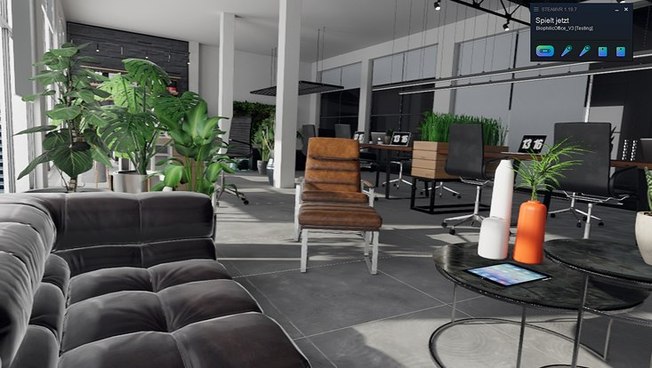19 June 2023
New study showsPlants Improve Performance and Feelings of Wellbeing in Virtual Realities

Photo: UHH/HCI
More than 50 percent of the world's population lives in urban areas, set to increase to 68 percent by 2050. Many people already only have limited access to nature, as human-made living spaces are often separated from their natural environment. At the same time, fewer and fewer people are working in a traditional office, a development accelerated by remote working during the COVID-19 pandemic. In the future, this trend may even increase through the use of new kinds of immersive virtual-reality (VR) working spaces.
An interdisciplinary research team has now examined the effects of virtual plants in a VR office environment on cognitive performance and the psychological wellbeing of test subjects.
“The results of our study show that participants performed markedly better both in tasks that required short-term memory and tasks requiring creativity than people who did not have any plants in their virtual offices. In addition, they scored higher for psychological well-being and felt less anger and aggression,” reports Dr. Fabria Mostajeran, lead author of the study and member of the Human-Computer Interaction working group at Universität Hamburg.
“The virtual office with plants was perceived as more relaxing, and made people feel more like there were physically there. Taken as a whole, these results emphasize the positive effects for users of plants in VR spaces, and provide valuable insights for designing future work and learning spaces,” explains Prof. Dr. Frank Steinicke, co-author of the study and head of the working group.
For this study, researchers designed two test environments, using the same virtual office: one with plants, and one without. Then, 39 test subjects were given tasks requiring short-term memory or creativity, to complete in these virtual environments. In contrast to earlier work, the presence of plants or lack thereof was examined in isolation only where no other potential disruptions could have affected the observed results. In addition to cognitive tests, the test subjects rated their mood and their feelings after leaving the environments.
Original publication:
F. Mostajeran, F. Steinicke, S. Reinhart, W. Stuerzlinger, B. E. Riecke, and S. Kühn: Adding virtual plants leads to higher cognitive performance and psychological well-being in virtual reality, Sci Rep 13, 8053 (2023). https://doi.org/10.1038/s41598-023-34718-3
